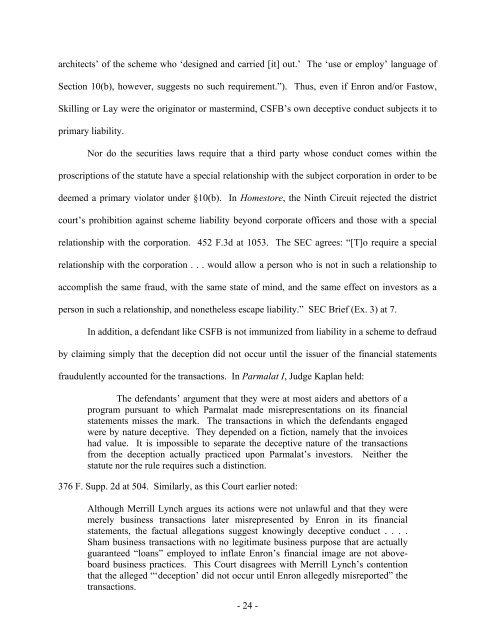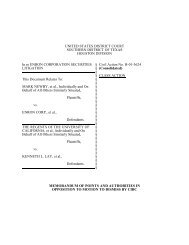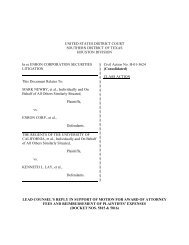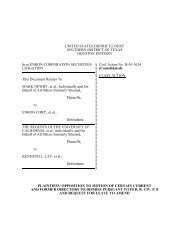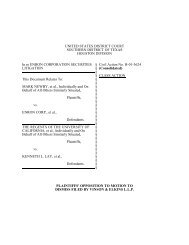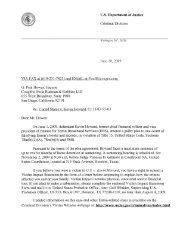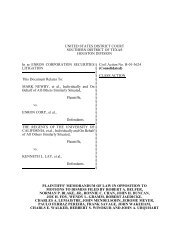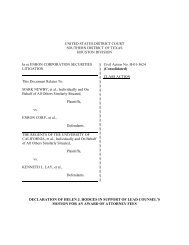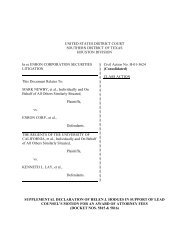- Page 1 and 2: UNITED STATES DISTRICT COURT SOUTHE
- Page 3 and 4: Page (2) Nile: Fake “Sale” of A
- Page 5 and 6: Page (1) DLJ Concealed Transfer Res
- Page 7 and 8: Page 4. CSFB’s Control Over Its S
- Page 9 and 10: - viii - Page City of Monroe Emps.
- Page 11 and 12: - x - Page In re Enron Corp. Sec. D
- Page 13 and 14: Page Kunin v. Feofanov, 69 F.3d 59
- Page 15 and 16: Page Simpson v. AOL Time Warner Inc
- Page 17 and 18: Lead Plaintiff The Regents of the U
- Page 19 and 20: • Prepays: These were loans CSFB
- Page 21 and 22: “‘Wrongdoers could studiously a
- Page 23 and 24: internally that Enron’s reporting
- Page 25 and 26: order to engage in structured-finan
- Page 27 and 28: A. Well, Enron had a problem in tha
- Page 29 and 30: CSFB denies making exorbitant retur
- Page 31 and 32: activities of one of the banks at t
- Page 33 and 34: ‘informing the district court of
- Page 35 and 36: There is long-established doctrine
- Page 37 and 38: e “construed not technically and
- Page 39: CSFB argues throughout its brief th
- Page 43 and 44: Judge Kaplan rejected the defendant
- Page 45 and 46: Id. at 625-26. The Court upheld the
- Page 47 and 48: Order. And because of this Court’
- Page 49 and 50: [R]egarding Credit Suisse First Bos
- Page 51 and 52: a. Related-Party Transactions (1) L
- Page 53 and 54: Rhythms Stock, and trading was thin
- Page 55 and 56: NatWest. 49 The remaining limited p
- Page 57 and 58: Ogunlesi Depo. Tr. at 294:25-295:15
- Page 59 and 60: Diagrammatically, the transaction a
- Page 61 and 62: This transfer, however, was a sham.
- Page 63 and 64: As to LJM LP, CSFB contributed $7.5
- Page 65 and 66: false appearance of fact.” Homest
- Page 67 and 68: transaction “created the appearan
- Page 69 and 70: A. Yes. Q. It came from CSFB or an
- Page 71 and 72: Q. How were ERNB’s activities con
- Page 73 and 74: inherently deceptive nature of the
- Page 75 and 76: To give the appearance that Enron w
- Page 77 and 78: test). LJM LP was considered a sepa
- Page 79 and 80: and to disguise debt, Enron engaged
- Page 81 and 82: CSFB 2000 Prepay Morgan Stanley $15
- Page 83 and 84: Ex. 40330 (12/30/01 SEC Complaint a
- Page 85 and 86: price risk for the counterparties,
- Page 87 and 88: fluctuated with the price of oil. U
- Page 89 and 90: of commodity swaps, commodity price
- Page 91 and 92:
Q. So the transaction being complet
- Page 93 and 94:
against any credit loss on the deal
- Page 95 and 96:
10 required that there existed “t
- Page 97 and 98:
employees who worked on the 2000 Pr
- Page 99 and 100:
Q. And Mr. Wootton was adamant that
- Page 101 and 102:
Equally unavailing is CSFB’s obse
- Page 103 and 104:
Where a wrongdoer, intending to dec
- Page 105 and 106:
CSFB never directly misrepresented
- Page 107 and 108:
(2) Year 2001 Fake Oil “Prepay”
- Page 109 and 110:
As with the 2000 Prepay, the eviden
- Page 111 and 112:
Thus, just as with the 2000 Prepay,
- Page 113 and 114:
Under these Standards, an issuer co
- Page 115 and 116:
funds from an SPE called Salamander
- Page 117 and 118:
10/29/04 Deposition Transcript of D
- Page 119 and 120:
EC35628A0051089. CSFB knew the Igua
- Page 121 and 122:
expected return on the deal - even
- Page 123 and 124:
a fiction, namely” (id. at 504) t
- Page 125 and 126:
A. I think in this case it wasn’t
- Page 127 and 128:
Id. at 710:25-711:9. Thus, one clea
- Page 129 and 130:
CSFB and issuing $1 million of Cert
- Page 131 and 132:
fact, both aspects of the Nile tran
- Page 133 and 134:
Ex. 10211 at CSFBCO0005423523 (Augu
- Page 135 and 136:
that the transaction was really a l
- Page 137 and 138:
A. No. Q. To your knowledge, did an
- Page 139 and 140:
Bass Depo. Tr. at 433:6-434:1; 11/3
- Page 141 and 142:
crap” from the ServiceCo valuatio
- Page 143 and 144:
Such deceptive conduct as well clea
- Page 145 and 146:
in the deal. Defs’ Mem. at 40. Th
- Page 147 and 148:
CSFB that “permitted [Enron] to r
- Page 149 and 150:
As with Iguana and Nile, Nikita fai
- Page 151 and 152:
Last business day of each calendar
- Page 153 and 154:
But also, CSFB is additionally liab
- Page 155 and 156:
knew was truly not at risk it, as d
- Page 157 and 158:
Solomon explains 157 that in the Ra
- Page 159 and 160:
funds to ENA. The loan between Sund
- Page 161 and 162:
our credit risk is now directly 100
- Page 163 and 164:
Depo. Tr. at 67:4-7. These three de
- Page 165 and 166:
share-trust structure, Enron could
- Page 167 and 168:
Solomon App. at 279. 177 The Osprey
- Page 169 and 170:
The Condor Share Trust (“Condor
- Page 171 and 172:
paid to the outside investor by the
- Page 173 and 174:
the assets from Enron. Enron had bu
- Page 175 and 176:
A. Yes. That was part of the struct
- Page 177 and 178:
elated party to Enron, this “equi
- Page 179 and 180:
A. Yes, I did. Q. (BY MR. HOWES) An
- Page 181 and 182:
was a sham entity because it purpor
- Page 183 and 184:
DLJ Employees DLJ Capital Corp LJM2
- Page 185 and 186:
So DLJ would furnish the false appe
- Page 187 and 188:
and $42.5 million of debt for the $
- Page 189 and 190:
A. None that I recall. 8/1/05 Capol
- Page 191 and 192:
ules were violated is sharply contr
- Page 193 and 194:
Issuer entity) issued $1.024 billio
- Page 195 and 196:
Diagrammatically, Marlin I appeared
- Page 197 and 198:
DLJ knew the purpose of its Marlin
- Page 199 and 200:
A. Structurally, yes, absolutely, c
- Page 201 and 202:
CSFB further worked to execute Marl
- Page 203 and 204:
to demonstrate simply that CSFB kne
- Page 205 and 206:
F.3d 1061, 1068 (5th Cir. 1994); an
- Page 207 and 208:
CSFB was no doubt highly interested
- Page 209 and 210:
7/21/04 Moran Depo. Tr. at 209:4-10
- Page 211 and 212:
ServiceCo - what it acknowledged as
- Page 213 and 214:
CSFBCO005534606; Ex. 13923 at CSFBL
- Page 215 and 216:
“55.6% of the equity in Rawhide I
- Page 217 and 218:
Q. And the client was Enron? A. Yes
- Page 219 and 220:
The Firefly transaction is further
- Page 221 and 222:
Solomon Report at 301. CSFB knew th
- Page 223 and 224:
on Enron’s investors - as long as
- Page 225 and 226:
(Overview of Pricing for Marlin Wat
- Page 227 and 228:
170 F.3d 518, 534 (5th Cir. 1999).
- Page 229 and 230:
concerning Enron during the Class P
- Page 231 and 232:
emained strongly bullish until Enro
- Page 233 and 234:
* * * A. I think I’m just saying
- Page 235 and 236:
(“Sicoardi”) it was a great buy
- Page 237 and 238:
financials: “I should have taken
- Page 239 and 240:
According to Sakol, “there was an
- Page 241 and 242:
Q. And you said to them, I want to
- Page 243 and 244:
A. No. 8/26/05 Deposition Transcrip
- Page 245 and 246:
Q. But you knew at the time, in 199
- Page 247 and 248:
13097A. The questions were sent not
- Page 249 and 250:
Securities Laws §12:2 at 12-9-12-1
- Page 251 and 252:
3. CSFB Breached Its Duty to Disclo
- Page 253 and 254:
debt within the Nighthawk structure
- Page 255 and 256:
. The Osprey I Offering Circular Co
- Page 257 and 258:
eference to “Project Leftover,”
- Page 259 and 260:
(Interrogatory Response Nos. 5 & 6)
- Page 261 and 262:
(3) DLJ Concealed the Fact Enron Ne
- Page 263 and 264:
f. The Osprey II Offering Circular
- Page 265 and 266:
atios were not met and the “BBB
- Page 267 and 268:
These statements were removed from
- Page 269 and 270:
g. DLJ/CSFB Concealed LJM1 and LJM2
- Page 271 and 272:
“Permitted Investments to Date”
- Page 273 and 274:
Solomon Supplemental Report, Schedu
- Page 275 and 276:
Offering Circulars because the “r
- Page 277 and 278:
k. Plaintiffs Have Standing to Asse
- Page 279 and 280:
CSFB argues “Dr. Nye admits that
- Page 281 and 282:
Marlin and Osprey offering memorand
- Page 283 and 284:
E. CSFB’s Conduct Was “In Conne
- Page 285 and 286:
F. There Is a Genuine Issue of Mate
- Page 287 and 288:
[Enron] would be unable to service
- Page 289 and 290:
Company’s “reports of current r
- Page 291 and 292:
counterparties. Nye Report, 51. But
- Page 293 and 294:
As documented and considered by Dr.
- Page 295 and 296:
U.S. Dist. LEXIS 41240, at *63-*64)
- Page 297 and 298:
(FACC 450). These allegations sketc
- Page 299 and 300:
2. Lead Plaintiff Need Only Show th
- Page 301 and 302:
NAME Title at CSFB (USA) Title at C
- Page 303 and 304:
structuring specialists in New York
- Page 307 and 308:
WOLF POPPER LLP ROBERT C. FINKEL 84


